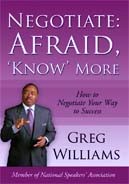Discover how you can become a better negotiator!
Negotiation Tip of the Week
# 1040
“Use ‘If’ to Increase Your Negotiation Propositions”
To Watch this ‘Tip’ click here – http://budurl.com/ViewIfToIncreaseNego
To Listen to this ‘Tip’ click here- http://budurl.com/HearIfToIncreaseNego
Have you ever considered how strong the word ‘If’ is, in a negotiation? ‘If’ is a conditional statement that requires action to receive the offer contained in the ‘If’ proposition. As an example, if you pay attention to the information that follows, you’ll increase your negotiation outcomes. If you don’t heed the information, you’ll miss the value contained in it.
Such is the value of using ‘If’ in your negotiations to position your proposition. If the other negotiator doesn’t adhere to the covenants of your offer, you’re not obligated to fulfill it. Regardless of whether he pursues your conditioned offer or not, you get insight into the mindset he possesses and how he might maneuver in the negotiation based on the manner in which you position your proposition.
When you’re engaged in a negotiation, consider how you will position your proposition, by prefacing some conditions with the word ‘If’. The following are ways in which you can use ‘If’ to enhance your negotiation outcomes.
How to use ‘If’ as an offensive tactic:
As an offensive tactic, ‘If’ is used as a way to test your offers, without obligating you to fulfill them. If the ‘If’ proposition is not agreed to by the other negotiator, your obligation is abated (i.e. If I make an offer and you accept it, I’m obligated to fulfill the offer. If on the other hand, you do not meet my offer, I’m not obligated to fulfill it.)
‘If’ can also be combined with ‘And’ to create a nested environment (one in which many “If’s” may come into play as one offering (i.e. If you agree to points one and two and three, I will respond favorably.) At this point, you can also have a red herring included in your offering (one that doesn’t matter that much to you, but carries weight in the mind of the other negotiator) in order to increase the perception of the offer.
How to use ‘If’ as a defensive tactic:
‘If’ can be used as a defensive tactic to ferret out a hidden position that the other negotiator does not wish to disclose. It can also be used to test his position, to assess the viability of his proposition, as to the value it contains to him. In doing so, you can glean insight into how long the other negotiator may stick with a position, or when he may figure the cost to do so is too great. To implement the ‘If’ tactic for this purpose, use it to couple weighted positions against his points.
(Example) The other negotiator has indicated that his offer of $10,000 for items one, two, and three is the most he can pay. Your response in seeking which is of more value to him might be, if you could only obtain two out of the three items, which two might they be? His response might be, I need all three for $10,000, to which you might respond by saying, humor me. At that point, you’d reiterate your offer. Once he responded, you’d have insight into the two items that contained the most value in his mind.
If you use ‘If’ as an offensive or defensive tactic, it’s use will allow you to test offers and fend off propositions that would leave you in an untenable position. When negotiating, never ignore the power that’s contained in the word ‘If’. By using it in your negotiations, you’ll enhance the flow of the negotiation. You’ll also have more control in the negotiation … and everything will be right with world. Remember, you’re always negotiating.
The Negotiation Tips Are …
- Take time to discover the power in ‘If’. By doing so, you’ll uncover hidden opportunities when negotiating that you might otherwise overlook.
- To make ‘If’ more effective, use it in the appropriate manner, in the appropriate environment, for the appropriate situation. In essence, don’t dilute its power by using it too frequently.
- ‘If’ sets a condition that unless the condition is met, the provider of the statement is not obligated to fulfill the covenant of the statement. Thus, the use of ‘If’ can save you lots of time and effort.
Special Offer:
To inquire about having The Master Negotiator as a coach or consultant, or to conduct ‘live’ instructional sessions, and/or keynote presentations at your company, group, or organization, please send an e-mail to GregWilliams@TheMasterNegotiator.com and start getting more of what you deserve out of life. Please include the verbiage, ‘Negotiation Inquiry’ in the subject line.
©MMXI Greg Williams (The Master Negotiator/Body Language Expert), All rights reserved.

